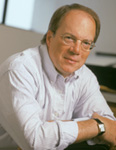Living in Interesting Times
Resisting Change
The State Bar and other entities are studying how
nonlegal groups and events threaten the traditional order of the legal
profession. Outreach to members is critical, because the results will
long affect the profession.
by George C. Brown,
State Bar executive director

RECENTLY, SEVERAL FRIENDS, knowing the changes that are facing the
Bar and the Bar association, have provided me a passage from
Machiavelli's The Prince.
In his 16th century pamphlet, Niccolo Machiavelli, the son of a
lawyer, advised Prince Lorenzo Di Medici "... that there is nothing more
difficult to carry out, nor more doubtful of success, nor more dangerous
to handle, than to initiate a new order of things. For the reformer has
enemies in all those who profit by the old order, and only lukewarm
defenders in all those who would profit from the new order, this
lukewarmness arising partly from fear of their adversaries who have the
laws in their favor; and partly from the incredulity of mankind, who do
not truly believe in anything new until they have had actual experience
of it." (Chapter 6)
Machievelli's words ring true today because he is writing of the
human condition. Though Machiavelli writes about the political dangers
to a reformer of being what we today call a change agent, he also is
writing about the natural human response to change. Those who are
successful under the current rules (whether those rules are statutory
law, judicial opinion, or the informal rules of life and work) will
resist change "with the zeal of partisans." At the same time, those who
may benefit from the new rules will support them only lukewarmly because
the new rules are not yet fully known, and those who may benefit do not
know how or if they ultimately will benefit under the new rules.
This resistance to change is especially strong when that change comes
from the outside, whether from a conquering nation-state as in
Machiavelli's time, or a group or event that threatens the traditional
order of the profession in our time, such as CPAs, banks, real estate
agents, financial planners, pro se litigants, or the rise of the
Internet.
In the last year, the various efforts to deal with change have
included the Wisconsin Supreme Court's task force to find ways to manage
the massive increase in pro se litigation that is clogging many of our
courts; the joint efforts of the State Bar, the supreme court, and the
League of Women Voters to understand and improve public trust and
confidence in the legal system; and the State Bar's efforts to come to
grips with the intrusion of nonlegal professionals into traditional work
of lawyers through the "Seize the Future" initiative.
None of these efforts is complete. There is no consensus among the
profession as to their resolution. Some argue that consensus on these
large issues is impossible, that leadership is required.
In May, the State Bar Board of Governors adopted a resolution to
create a Wisconsin Commission on Multidisciplinary Practice to draft a
report and recommendations dealing with all aspects of MDPs for
consideration by the board at its September 2002 meeting. Outreach to
the members is a critical part of the process. Public hearings will be
held statewide in March and April 2002, with an Assembly of Members
convened during the May 2002 convention.
The results of this process will have a long-lasting impact on the
profession. And whatever has an impact on the profession most certainly
has an impact on the State Bar association.
In times like these, the assuring words of another lawyer provide
strength: "I do the very best I know how, the very best I can. If the
end brings me out all right, what is said against me won't amount to
anything. If the end brings me out wrong, ten angels swearing I was
right would make no difference." - A. Lincoln
Wisconsin Lawyer
